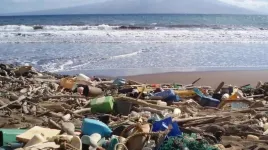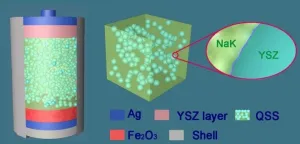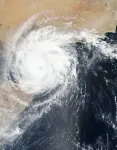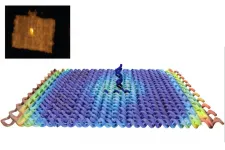Are plastics and microplastics in the Ocean on the increase?
The answer might not be so straightforward
2021-02-01
(Press-News.org) That is the question that Prof. Alan Deidun, resident academic within the Department of Geosciences of the Faculty of Science, along with a cohort of high-profile co-authors, posed within a study recently published in the Microplastics and Nanoplastics journal. Specifically, the study overviews a plethora of marine litter monitoring survey data available for different regions of the world ocean, as well as modelling data, in order to answer this compelling question.
The study, whose lead author is renowned litter researcher Dr Francois Galgani from IFREMER, concludes that, despite the well-known increase in the volume of plastics making their way to the marine domain from land, most studies indicate constant amounts of litter in coastal marine systems in recent years until 2019. For instance, collections of marine litter by Continuous Plankton Recorders showed relatively unchanged amounts trapped annually in the North East Atlantic since the year 2000, following a steady increase since the 1950s. For some components of marine litter, such as industrial pellets, policy-making seems to be effective given that measures taken to reduce their use in industrial practices seem to have translated into smaller volumes of this component being detected within the marine domain.
Although a prima facie a surprising find, this 'steady state' scenario could be indicative of:
a transfer of plastic litter to remote areas of the global ocean, where human monitoring programmes are non-existent or subdued, such that the same litter does not feature in statistics and/or
the degradation into smaller fragments (micro- and nanoplastics) of the same litter which can go undetected due to its small size (e.g. fibres within microplastic nets) or since they are within marine biota.
The published study emanated from Chapter 12 of the UN's Second World Ocean Assessment, which is imminently set to be released by the UN in the coming months. Prof. Deidun features as a co-author within two different chapters in such an Assessment, including the ones on marine alien species and on benthic invertebrates. The same study concludes by soliciting, within the current UN Decade for Ocean Sciences, a greater research effort to be invested in identifying the sources of the marine litter as well as in the degradation pathways for different components of the same litter, as otherwise our capacity to identify temporal trends in marine litter will not progress further.
Statistics related to marine plastic litter make for sobering reading. For instance, according to the Ocean Conservancy, an estimated 8 million tons of plastic enter seas worldwide each year, on top of the 150 million plastic tons already roaming the same seas. A staggering 380 million tons of plastic are produced annually, of which an estimated 50% is Single-Use Plastic (SUP), including the 500 billion plastic bags sold worldwide each year and which, on average, have a lifetime of just 15 minutes.
INFORMATION:
The full publication can be accessed online.
[Attachments] See images for this press release:

ELSE PRESS RELEASES FROM THIS DATE:
2021-02-01
The impact of ozone on soybean production can be predicted more accurately thanks to improvements to a computer modelling system.
Surface ozone is a pollutant that affects plant growth by entering leaves and reducing the rate of photosynthesis, and rising ozone levels could severely limit production of crops including soy.
Being able to estimate this damage on soybean production using a "climate-vegetation model" is vital for predicting global and regional soy yields in the future.
This study uses results from a field experiment in the USA, which found that a normal ozone level of 10ppm/h (AOT40) could reduce soybean yield by 10%.
At extreme ozone levels - comparable to those observed on very polluted days in some parts of the world - soybean production fell to less than ...
2021-02-01
Increases in life expectancy in the UK and elsewhere had slowed even before 2016 - and COVID-19 is expected to further eliminate any gains, Newcastle University studies show.
After 2011, over the post-financial crisis period the authors find that the UK performed poorly, in almost all measures, compared to the 28 countries of the European Union (EU28).
Life expectancy at birth, and age 65, in the UK were increasing rapidly in 2008 but slowed around 2011 and Germany, Portugal and France showed evidence of a similar slowing.
Furthermore, years of good health, called Healthy Life Years, at birth in the UK decreased, whereas it increased in most EU28 countries. The UK experienced a period ...
2021-02-01
Using salt as a key ingredient, Chinese and British researchers have designed a new type of rechargeable battery that could accelerate the shift to greener, electric transport on our roads.
Many electric vehicles (EV) are powered by rechargeable lithium-ion batteries, but they can lose energy and power over time. Under certain conditions, such batteries can also overheat while working or charging, which can also degrade battery life and reduce miles per charge.
To solve these issues, the University of Nottingham is collaborating with six scientific ...
2021-02-01
The year 2020 played host to an uncharacteristically large number of natural disasters. The year began with large wildfires in the Amazon rainforest and Australia. A series of wildfires broke out in the American states of California during summer and Oregon in September 2020. In particular, the Oregon wildfire intensified to an uncontrollable extent and was spread over a wide area by strong gusts of wind that carried it forward. These unseasonably strong winds may have been stoked by an unexpected source: typhoons on the other side of the Pacific Ocean.
In late August and early September, three storms--Bavi, Mayask, and Haishen--occurred just two weeks apart in the Korean peninsula, causing floods, mudslides, and several casualties. In a recently ...
2021-02-01
T-cells are an important component of our immune system: with the receptors they carry on their surface, they can recognise highly specific antigens. Upon detection of an intruder, an immune response is triggered. It is still unclear exactly what happens when antigens are recognised: How many antigens are necessary to elicit an immune response, and does the response depend on their spatial arrangement?
These effects take place in the nanometer range - on the size scale of molecules, far below what can be seen with ordinary microscopes. To study all this, tiny tools are needed. Therefore, an unusual method was used at TU Wien: DNA molecules were folded in an ingenious way, similar to the paper folding ...
2021-02-01
Students from lower socio-economic groups (SEG) are less likely to participate in sport or physical activity at university, research from Sheffield Hallam University has found.
The main barriers affecting participation were found to be down to cost of being part of a sports team, lack of time due to academic commitments, part-time working or their social life taking precedence and limited prior knowledge of and participation in sport before starting university.
Funded by British Universities and Colleges Sport and published in the peer-reviewed Sport, Education and Society journal, the study surveyed over 700 students from 20 universities and found those that had participated in sport and physical ...
2021-02-01
A collaboration between the Pericàs group with Prof. Timothy Noël and Dr. Paola Riente at the Eindhoven University of Technology (TU/e, The Netherlands), has crystallised in a Nature Communications paper where they provide key insight into the chemical nature of the true photocatalyst involved in the Bi2O3-driven atom-transfer radical addition (ATRA) reaction.
Back in 2014, ICREA professors Miquel Pericàs and Emilio Palomares together with former postdoctoral researcher Dr. Riente published a paper on Angewandte Chemie International Edition pioneering the research on organic transformations in mild reactions conditions ...
2021-02-01
The work of the research group under the guidance of Professor Leonid Martyushev (co-authors: Roman Bando and Evgenia Chervontseva) will help to predict the behavior of fluids in various environments.
"When oil wells are depleted, water is pumped there under pressure to force the residual oil to the surface. If the interface between water and oil were an even layer, then it would be safe to say that as a result of water injection we recover all the residual oil. But since the interface between the two liquids is a highly distorted section, oil, contrary to expectations, can still remain underground, while water comes out to the surface. This is where our calculations come in ...
2021-02-01
The coronavirus crisis has led to some of the general public developing a critical view of the current food consumption model, as shown by a recent survey by the Catalan Consumer Agency, which reveals that 60.5% of all Catalans tend to think that the pandemic will promote more responsible, sustainable and fair consumption. Moreover, the various lockdowns have caused a significant increase in online shopping throughout Spain, with a 92% rise in volume and a 114.5% rise in value, according to aggregated consumption data from the Ministry of Agriculture, Fisheries and Food. This change in shopping habits and the awareness of the food model may also ...
2021-02-01
The human body strives to keep itself in homeostasis, or balance. When blood clots are created, the body's innate response is to break the clots down to prevent significant health problems from arising.
Research has found that patients with COVID-19 are prone to serious blood clotting. This is why many patients receive high dose anticoagulants as part of their treatment.
But a new study in Scientific Reports, led by senior author Daniel Lawrence, Ph.D., a Professor of Basic Research in Cardiovascular Medicine at Michigan Medicine, found that aside ...
LAST 30 PRESS RELEASES:
[Press-News.org] Are plastics and microplastics in the Ocean on the increase?
The answer might not be so straightforward




